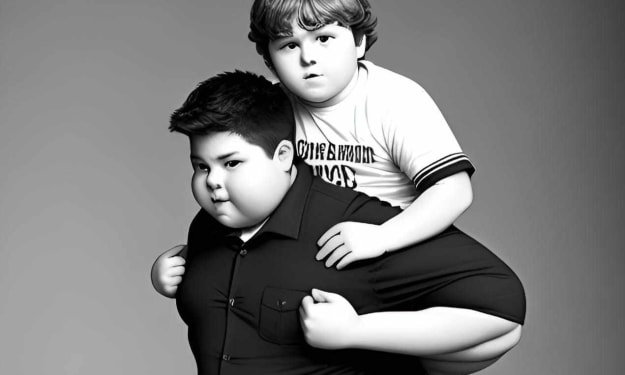From Skin to Skin
A black boy's journey towards black acceptance

What do you say to yourself being raised in white America as a fourteen-year-old black boy? What do you tell yourself when the media depicts white as beautiful and shows little to no concern for anyone else? What does that do to a child psychologically? It makes them feel like they were birthed in the wrong bodysuit, gazing into the mirror, seeing their melanin as the culprit, like there was a pigmentation mistake in the baby-making department, and they got swapped out for another. That is how I felt at the time. It got to a depressing point where I scoured the web, soul-searching YouTube videos of how to change skin colors and appear more white. The video response was a black man applying an excessive amount of baby powder on his face as a parody. Now, even though the video came off as satire, at the time, I was unnerved because clearly, I was facing psychological issues that took root in my childhood. From wanting my name changed to wishing to be somebody else entirely seemed very off-putting, especially as an eight or nine-year-old. I would not know how to respond if my child asked, "Why am I made like this?" and, "Why am I so ugly," especially if you heard the word beautiful and immediately associated it with your white counterparts.
So why am I writing this? Why am I exposing myself? A person's most humiliating moment is having a false sense of reality and dignity: an existential crisis. I believed that blackness was cursed and whiteness was blessed. I lived in an alternative reality where I begged the question, "am I white? Am I a white child trapped in a black body?" I wrestled with the dichotomy of believing I was white yet not knowing how to fully live it out while being black. That further raised the question, what is whiteness, and what does it entail? At the time, I was not entirely sure because my peers would constantly remark, "you act so white," and "you are one of the good ones." I began to ask myself, "what does that mean?"
Not once did my peers never had to go home and see themselves as the issue in society. Every time I looked down at my feet, every time I looked in the mirror, seeing piercing eyes analyze the details of my face, all I ever saw was my melanin, not the lack thereof. Furthermore, it does not help my case when your parent's friend sees you as a bad influence, despite proving otherwise. Between split statements of "being one of the good ones" from peers and "stay away from people like him" from adults, I did not understand what they meant by these remarks. Now I know it to be covert racism, courtesy of my peers, and overt racism and discrimination from the adults.
Similarly, as a bilingualist who would speak English for a typical Karen's comfort, I behaved in a tolerable way that was not awkward for my peers or obstructed societal standards. Or was I? Was I willing to forfeit the reality of my blackness and the truth of my personhood because of predispositions that I had of myself and my peers' acceptance? I can assure you it was a resounding yes, at the time.
As time journeyed on, there was a dualistic notion of mind versus body. In my mind, I knew of myself as white, but in the flesh, I was black. It was a twisted distortion of what MLK said about looking towards a day where people are not judged by the color of their skin but by the content of their character. The striking contrast was that I wanted my skin color to change without diminishing my character. It was a desolate mental state.
For years on end, I wrestled with the fact that I was black, that I was indeed African American. It was a pill I could not swallow at the time, being a child and all. Let's face it, check-marking a box indicating and fueling a perpetual reminder that you are African before American is heart-wrenching; I wanted it to change; I needed it to change. I thought I could instantly transform skin colors in an instant, like a magic trick, hoping the illusion would finally resolve and I would wake up anew. There was even a time where I thought applying Noxzema would literally burn the black off. That was never the case. What I suffered from was an extreme case of cognitive dissonance or code-switching.
I was not wrestling with peer acceptance in the sense of inclusion, nor was I fighting for being somebody else; I was grappling with understanding who I was in White America. I started to understand the disparity between blackness and Americanness; being white means being American, and any deviation is considered a liability to society. This is why those childhood statements such as "being the good one" and "acting so white" always rubbed me the wrong way, even if, at the time, it was something I desperately craved.
Honestly, deep in the trenches of my being, I was weary of being treated differently due to my skin color. I was worn out being looked down upon. I was tired of the stereotypes. I was exhausted from the prejudice. I was fatigued with being the problem in society. It was not until I was sixteen years old, wherein that moment of realization that I apprehended skin color was not the problem, but man's hearts were. I knew it to be valid in my younger days, but I never internalized it as truth. At that moment, I looked to civil rights activists, such as MLK and W.E.B. Dubois, to help me on this journey towards black acceptance. When I began to decisively love myself without self-deprecation and angst, exponential growth in my perceptions, emotions, and even theology occurred. I no longer regarded skin color as a black or white issue but that of the heart. MLK's quote regarding skin color vs. character exposed nuance that I never imagined in my younger days. The spirit of a person defines who they are, not their skin color. Had I not gone through this learning process, I may have ended up bitter at an entire nation that seemingly turned its back against the minority.
All in all, I realized that if Jesus can be fully God and fully man, I can be entirely black, wholly his, and not be seen as any less of a human being. I can look in the mirror and see myself as an image-bearer. I can be grateful for the blessing of melanin, seeing it now as a tender kiss from the sun. I no longer feel obligated to make other people feel comfortable for the sake of convenience and realized, "some will be for you, others will be against you, but their words have no bearing on who's with you." I can see the beauty in the diverse creation of human beings. Even if we do not look or sound alike, it does not mean that one is somehow better than the other. We all are created equal. We all share the Imago-Dei: the likeness of God. My internal conflict became an external testimony that produced merits of inspiration and joy. I think that is the process of humanness; we suffer to better understand the nature of reality. Our sufferings are a means to reach an ultimate end. This is our hope: That in all of our outcries, all of our laments, in all of our afflictions, we can have optimism for our present-day predicaments. The dream that drove civil rights activists to push for civil liberties for a nation of people is the same confidence that went into writing this: liberation for my fellow neighbor. If I can help someone else know that they are not alone in their struggles, that their past does not define their present nor has any bearings on their future, it is all the more reason to share my story because we all have a narrative to share and a life to live.
Grace and peace.
About the Creator
Dailyn Townes
| Writer | Sneaker Designer | Intellectual Ambivert | Book Fanatic | Ever-growing |
Every person has a story to share and a life to live, but how we live matters just as much as what we're living for; who or what is driving you?






Comments (2)
This was wonderfully written, and I feel that struggle you explained so eloquently. I read “white like me,” and I have always been aware of how people treat those who aren't white. Being a girl who was typically more attracted to anyone who wasn't white, my family would question me constantly and even be weird about me dating outside of white. I'm sorry you go through this inner turmoil mixed with people not knowing they are being shitty. You have such a way with words, so talented!
Damn. Super powerful, pained words. I'm white and this hit me hard. Beautifully done.